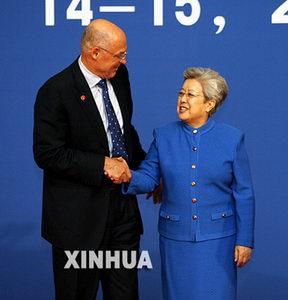China
Advice for US Treasury Secretary Paulson
Source: People's Daily | 12-15-2006 19:17
US Secretary of Treasury Henry Paulson has begun Thursday his China trip at the head of a super US financial and economic delegation, which comprises Ben Bernanke, chairman of the U.S. Federal Reserve Bank, and the U.S. Trade Representative Susan Schwab, and other senior financial officials of the Bush Administration. The visit of such a "high-level" delegation to China epitomizes the importance and closeness of Sino-US economic ties and the keen attention paid by the American side to problems existing in bilateral relations.
When talking to media reporters on his ongoing trip to China recently, Paulson said this move constitutes the first step in the US-China strategic dialogue, in which the protracted nature of the dialogue would be dealt with. Meanwhile, he said, he hoped that people should not pin too higher hopes on the substantial outcome of his trip.
 |
| China-U.S. first strategic economic dialogue ends. Full Story >> |
Public opinions estimate the US side will possibly set forth the ensuing topics for deliberation, such as subjects on further promotion of China's economic reform and the enforcement of a still more flexible exchange rate system and a somewhat high trade surplus with the Chinese side in the bilateral trade, on China's further opening of financial capital market, steady opening up of the medical and health care and the sphere of communications, and on intensified protection of intellectual property right.
All these topics can be said to be long-standing issues over recent years. Since the assumption of his post as US secretary of treasury, Paulson has taken a rather enlightened and open approach. With possible excessive pressures imposed by the American interest groups, however, Paulson said prior to his China visit that the pace for the RMB exchange reform was too slow and the international community would soon lose patience with no more due tolerance to be granted.
On the issue of RMB exchange rate reform, the general orientation is to be decided by the market, and China is precisely heading for this right direction. The RMB exchange rate to the US dollar has risen over five percent in recent years and the pace cannot be reckoned as slow. There is a drastic shortage of Christmas commodities in the United States at the end of this year due to a decline in China's exports to the U.S. and, for this situation, American consumers were not contented and unhappy.
As far as China's demand is concerned, it is all the more essential for the country to make the exchange rate more elastic and flexible but too rash moves in this regard are no good for the global financial stability or for Sino-US trade.
The imbalanced Sino-US trade has numerous factors. It is related to economic globalization and to the shift or reorganization of global industries, and it also has something to do with China's relative advantages in a number of low-end industries and the United States' excessive control on technological exports to China. China-made products have contributed to some extent to the US control on inflation, and punitive measures imposed upon Chinese products will be taken for penalizing American consumers.
With regard to the issue of opening up its banking and other spheres, China has opened RMB business in compliance with the commitment it had made upon its entry to the World Trade Organization (WTO) and the conventional international rules.
Chinese banks will also open to foreign financial institutions and social funds from both at home and from overseas, and this process will advance steadily under the precondition of maintaining financial stability.
Some US trade official have reproached China on the issue of observing the commitment it pledged upon the entry of WHO, which is not in line with the accepted international views and opinions. WTO Director General Pascal Lamy has spoken highly of China's conduct following its entry to the global trade body.
In a word, the economic and trade issue between China and the U.S. should be discussed from the strategic height, proceeding from the long-term interests of both sides, and consulted patiently from the overall angle with comprehensive planning and all-round consideration.
Editor:Du Xiaodan



